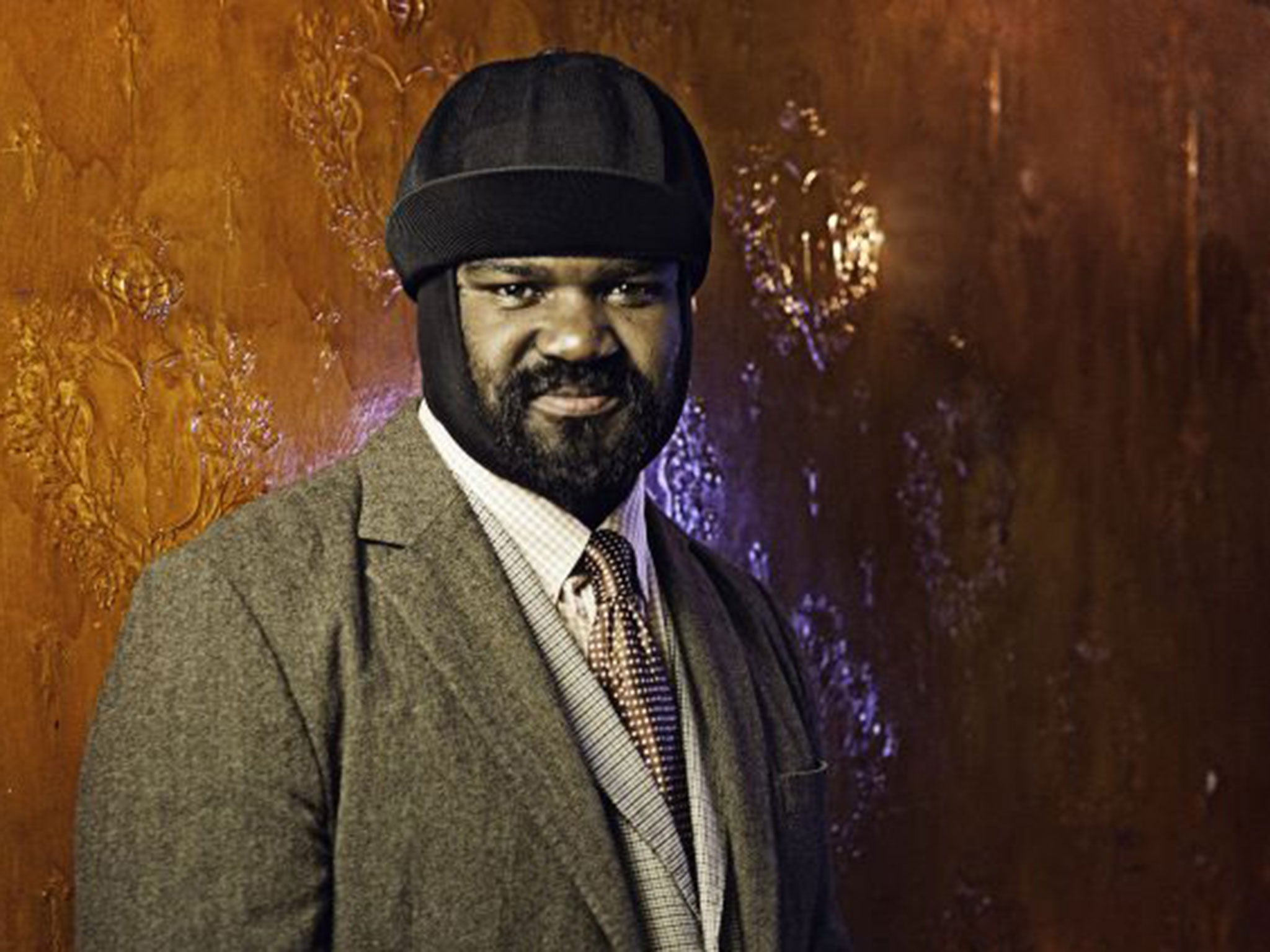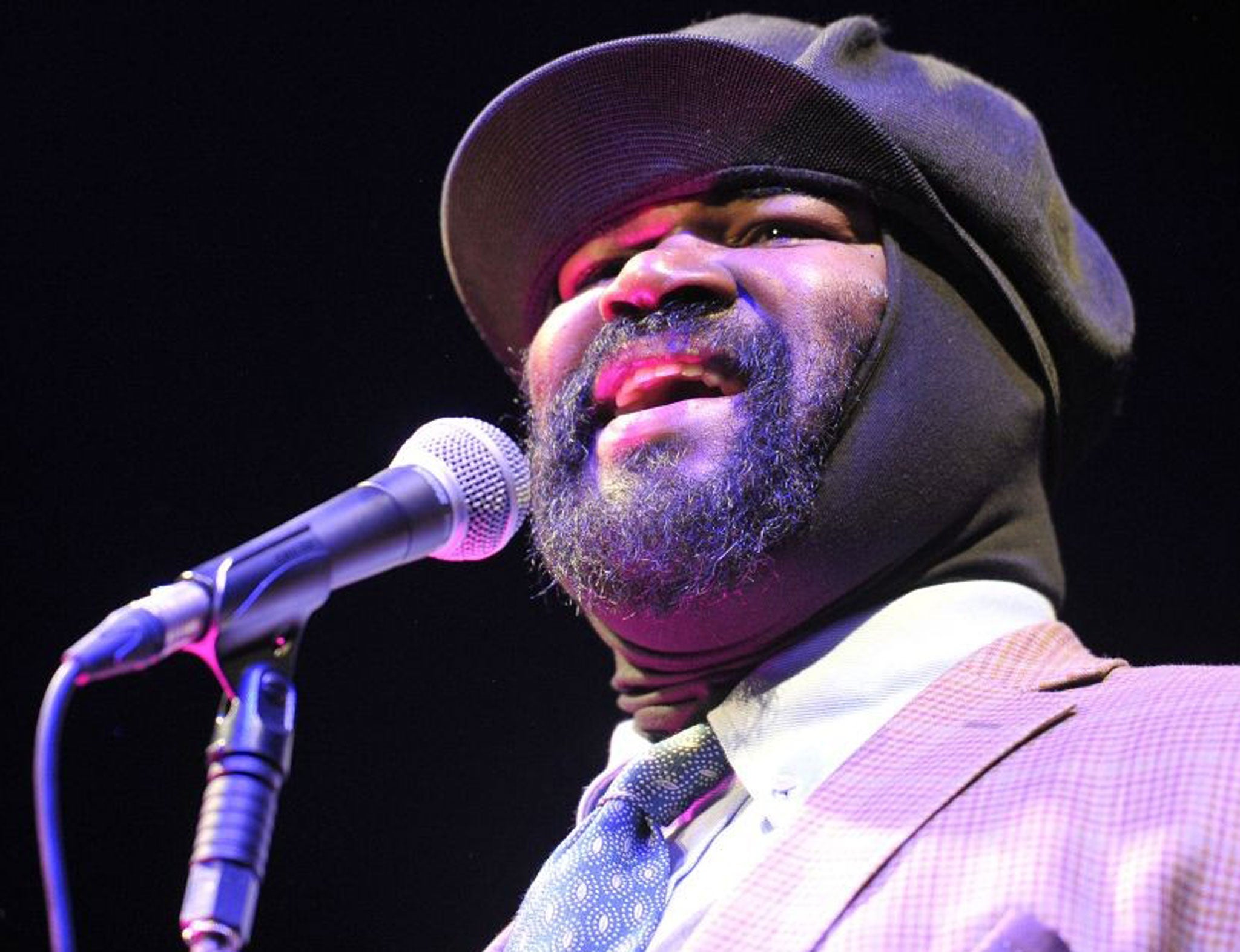Gregory Porter: 'Jazz got me out of the pain of losing my mother'
The singer found his voice after a childhood beset by poverty, racial abuse, and an absent father, he tells Cole Moreton

There is a secret sadness behind every word Gregory Porter sings. The giant American with the deep, rich voice has suddenly become the nation’s favourite jazz singer, but he is only performing because of the words his mother spoke as she lay dying from breast cancer.
“She was literally on her death bed,” says Porter. “She had been sent home to be with her family, connected up to the oxygen. The thing was cranked right up, but she still could not breathe.”
Still, Ruth Porter found the strength to tell her son he should try to become a professional singer – something he had never dared to consider until then. “I just couldn’t see how it could work.”
Her words changed his life. Porter did not make his first album until he was nearly 40, but his rise in the four years since has been astonishing. His latest, Liquid Spirit, won a Grammy and is still high in the charts half a year later, outselling Michael Jackson and Katy Perry.
Promoted heavily by the BBC, he has overtaken Jamie Cullum as the man British jazz fans listen to most online. His warm, soulful music was even used to pluck heartstrings during the funeral of Lucy Beale on EastEnders, not least because Shane Richie loves it. A Royal Albert Hall headline performance beckons next month.
Porter was going to be a professional American football player until injuries ended that dream. “I still have the scars. If your shoulder doesn’t stay in the socket when you run then you can’t play football.”
He has the build, a huge man dressed in a tailored sports jacket wearing the cap that has become his trademark: a mysterious black Kangol wraparound that he never seems to take off. “It’s just my thing,” he says.
The cat in the hat has manners to match his physical power and speaks like a Southern gentleman as he remembers growing up in Bakersfield, California. They were dangerous times.
“There was tension, based on our being black in a pretty much all-white neighbourhood. When I was a young boy people would urinate into beer bottles and throw them through the windows of our home. The police came in and stood us up, checking for glass.” One terrifying night, he saw a huge cross burning just outside his bedroom window.

“The cross was six foot tall, it burned and then it fell down in the lawn,” he says. “In the morning we went out to look at it and it was good wood, jointed. There were jeans ripped up and soaked in gasoline, the wire was wrapped around it. There was craftsmanship. I was fearful, but my mother was great. She was in our faces, letting us know, ‘You are valuable, you are worthy, there is nobody above you.’”
She was a preacher in tiny “storefront churches” whose faith kept her strong. “She was very bold and fearless. There were times when she would bring homeless people off the streets into our house.”
“There was a little boy who didn’t have clothes for his first day of school. My mother took the clothes I had selected and gave them to him. It was traumatic. Awful. I was like, ‘That’s mine!’” And yet he is smiling. “She was teaching me. She said, ‘You’ll understand one day.’”
His father was mostly absent. “There were touchstone moments – a Christmas here and a birthday there. He’d promise to show up at three o’clock but not get there until nine or ten at night.” Some of the anger faded after his father’s death. “I’ve come to a place of understanding. I learnt at his funeral he was a great singer. There is some of him in me and I have to thank him for that. The very thing that I’m living off right now is from him. This voice.”
Porter sang in church but had no thought of a career until that conversation with his mother. “I was trying to assure her that everything was gonna be cool.” He was going to be a town planner, he said. She listened and nodded and said yes, okay, but then jabbed a finger and spoke her mind. “She was like, ‘Ah! Don’t forget about the music! It’s the best thing you do.’” Two days later, she died.
“When she passed I was gone. I didn’t sing for a long time. Almost a year. I went to be with my brother, to get some inspiration just to get up in the morning. Then I did remember what she had said, once I was able to heal enough to deal with people looking at me.” Slowly, he began to find his voice. “I started to go to jazz jam sessions, three times a week. That was just a way of getting out of this funk of pain over losing my mother and not being an athlete any more.”
Porter found he could croon like Nat King Cole, soar like Marvin Gaye or rage like Gil Scott-Heron. He moved to New York and began working with fine musicians. But he was 39 before they released an album together, in 2010.
The critics hailed Porter as a modern great, and Water was nominated for a Grammy. So was Be Good in 2012, with its gorgeous, shuffling lead song. Then came international success this year with Liquid Spirit, released by Blue Note Records. He lives in Brooklyn now with his wife and their 18-month-old son.
“I think my father not being around can probably make me a better father,” he says. “I am conscious of what he didn’t do: not showing up, not being there, not praising achievements. That’s not going to happen, because I remember just the pain. I want my son to know that somebody’s got his back. I missed that.”
What would his mother make of his success? “She would really laugh. She would hear herself in me. She would probably be like, ‘I knew you’d do it!’ ”
Gregory Porter will perform on Strictly Come Dancing on 5 October and at the Royal Albert Hall on 27 October
Join our commenting forum
Join thought-provoking conversations, follow other Independent readers and see their replies
Comments
Bookmark popover
Removed from bookmarks